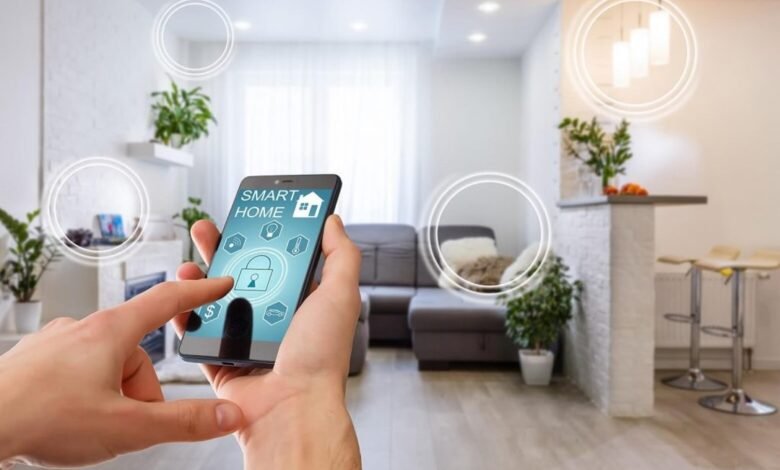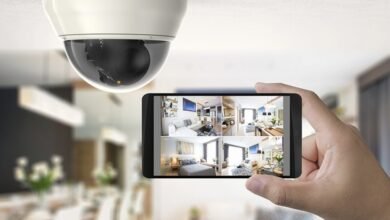Emerging smart home solutions for connected world.

In the rapidly evolving landscape of technology, emerging smart home solutions are reshaping the way we interact with our living spaces. With the increasing connectivity and integration of devices, the concept of a connected world is becoming a reality. Smart home solutions offer unprecedented convenience, efficiency, and security, catering to the needs of modern homeowners. As the demand for interconnectedness grows, smart home technology continues to advance, offering innovative solutions to enhance the way we live and interact with our homes.
The focus keyword “Emerging smart home solutions for connected world” encapsulates the essence of the transformative changes occurring in the realm of home automation. These solutions leverage technologies such as the Internet of Things (IoT) and artificial intelligence (AI) to create interconnected ecosystems where devices seamlessly communicate and collaborate. From voice-activated assistants to AI-powered automation, the possibilities for enhancing comfort, convenience, and efficiency in the connected world of smart homes are limitless.
Emerging smart home solutions for connected world
From Traditional Homes to Smart Homes
The journey of smart home technology began with the introduction of basic automation features, such as programmable thermostats and remote-controlled lighting. However, with advancements in technology, smart home solutions have evolved to encompass a wide range of interconnected devices, including smart appliances, security systems, and entertainment systems.
The Role of IoT in Smart Home Evolution
One of the key drivers behind the evolution of smart home technology is the proliferation of IoT devices. IoT technology enables everyday objects to connect and exchange data over the internet, allowing for seamless communication and integration between devices. This interconnectedness forms the backbone of smart home solutions, enabling users to control and monitor various aspects of their homes remotely.
Benefits of Smart Home Solutions
Smart home solutions offer a myriad of benefits, making them an attractive choice for homeowners looking to enhance their living spaces.
Convenience and Efficiency
One of the primary benefits of smart home solutions is the convenience they offer. With smart devices and automation systems in place, homeowners can streamline various tasks and processes, saving time and effort. From remotely controlling appliances to automating routine tasks, smart home solutions make everyday living more convenient and efficient.
Enhanced Security and Safety
Security is a top priority for homeowners, and smart home solutions provide advanced security features to protect against intruders and emergencies. Smart security cameras, motion sensors, and alarm systems can be integrated to create a comprehensive security network that offers peace of mind and protection for the home and its occupants.
Energy Efficiency and Cost Savings
Smart home solutions also contribute to energy efficiency and cost savings by optimizing energy usage and reducing utility bills. Features such as smart thermostats, energy-efficient appliances, and automated lighting systems help minimize energy wastage and lower electricity consumption, leading to long-term savings for homeowners.
Emerging Trends in Smart Home Solutions
As technology continues to advance, new trends and innovations are shaping the future of smart home solutions.
Voice-Activated Assistants
Voice-activated assistants, such as Amazon Alexa and Google Assistant, have become integral parts of smart home ecosystems, allowing users to control their devices and access information using voice commands.
AI-Powered Automation
Artificial intelligence is playing an increasingly important role in smart home automation, enabling devices to learn and adapt to users’ preferences and behavior patterns. AI-powered systems can anticipate users’ needs and automate various tasks to enhance comfort and convenience.
Integration with Wearable Technology
The integration of smart home solutions with wearable technology offers new possibilities for seamless interaction and control. Wearable devices such as smartwatches can be used to monitor and control home devices, providing users with greater flexibility and convenience.
Enhanced Connectivity and Interoperability
Interoperability is key to the success of smart home solutions, and efforts are being made to improve connectivity and compatibility between different devices and platforms. Standardization initiatives and protocols such as Zigbee and Z-Wave aim to create a unified ecosystem where devices from different manufacturers can seamlessly communicate and work together.
Challenges and Considerations
Despite the numerous benefits of smart home solutions, there are also challenges and considerations that need to be addressed.
Privacy and Data Security Concerns
The proliferation of connected devices raises concerns about privacy and data security. As smart home devices collect and transmit sensitive data, there is a risk of unauthorized access and data breaches. Manufacturers and users must implement robust security measures to protect against potential threats.
Compatibility Issues
Compatibility issues can arise when integrating devices from different manufacturers or using disparate platforms. Ensuring compatibility and interoperability between devices is essential to avoid compatibility issues and ensure a seamless user experience.
Affordability and Accessibility
While smart home technology offers numerous benefits, cost can be a barrier for some homeowners. The initial investment required to purchase and install smart devices may be prohibitive for some, limiting the accessibility of smart home solutions.
Future Outlook of Smart Home Solutions
Looking ahead, the future of smart home solutions is filled with exciting possibilities and advancements.
Expansion of IoT Ecosystem
The IoT ecosystem is expected to continue expanding, with an increasing number of devices becoming interconnected and intelligent. This expansion will further enhance the functionality and versatility of smart home solutions, enabling greater automation and customization.
Advancements in Artificial Intelligence
Advancements in artificial intelligence will drive innovation in smart home automation, enabling devices to become smarter and more intuitive. AI-powered systems will be able to anticipate users’ needs and preferences more accurately, providing personalized experiences and enhancing overall efficiency.
Customization and Personalization
Customization and personalization are integral aspects of emerging smart home solutions for the connected world. As technology advances, homeowners are seeking more tailored experiences that cater to their individual preferences and lifestyles. Smart home devices and systems are evolving to offer greater flexibility and customization options, allowing users to personalize their living spaces according to their specific needs and desires.
Read More: The power of voice control: Harnessing AI Assistants for Smart Homes
Conclusion
The emergence of smart home solutions represents a significant paradigm shift in the way we perceive and interact with our living spaces. As we move towards a more connected world, the integration of smart technology into our homes offers unparalleled convenience, efficiency, and security. From controlling appliances with voice commands to monitoring home security remotely, the benefits of smart home solutions are undeniable.
As the pace of technological innovation accelerates, the future of smart home solutions looks promising. With advancements in IoT, AI, and connectivity, we can expect even more sophisticated and intuitive smart home systems in the years to come. However, it is essential to address challenges such as privacy concerns and compatibility issues to ensure the widespread adoption and success of smart home technology. Ultimately, the connected world of smart homes holds the promise of a more convenient, efficient, and secure way of living for homeowners around the globe.
FAQs
Are smart home solutions expensive?
Smart home solutions vary in cost depending on the devices and systems chosen. While some devices may have a higher upfront cost, they can lead to long-term savings through energy efficiency and convenience.
How secure are smart home devices?
Security measures vary between devices and manufacturers, but it is essential to choose reputable brands and implement strong passwords and security protocols to protect against potential threats.
Can smart home devices be controlled remotely?
Yes, most smart home devices can be controlled remotely through a smartphone app or internet-enabled device, allowing users to monitor and control their homes from anywhere with an internet connection.
What are the privacy concerns associated with smart home technology?
Privacy concerns primarily revolve around the collection and transmission of sensitive data by smart home devices. It is essential to understand how data is being used and stored and to implement appropriate security measures to protect against unauthorized access.
How easy is it to install and set up smart home devices?
Installation and setup procedures vary depending on the device and manufacturer. While some devices may require professional installation, many smart home devices are designed for easy DIY installation and setup, with user-friendly interfaces and instructions.










